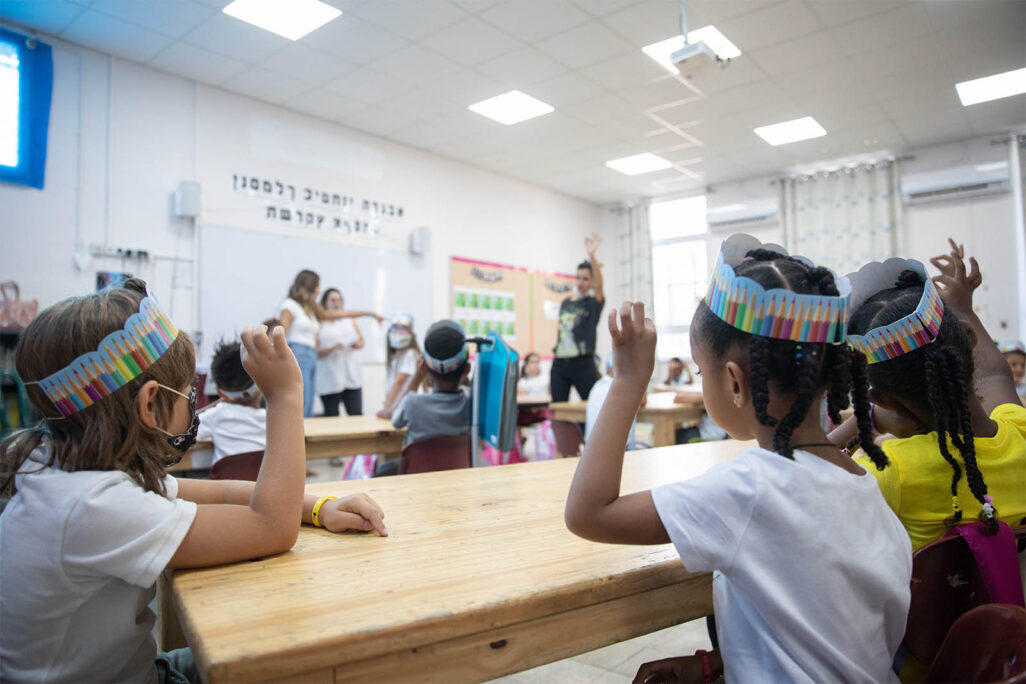
One quarter of students in Israel’s Hebrew-speaking schools are reading at a low literacy level relative to their age, according to recent reading tests carried out by the Ministry of Education.
Literacy and reading comprehension are among the most complex and important challenges faced by students in their early years of elementary school. Students’ ability to master these skills can have far-reaching effects on the further development of their cognitive and linguistic abilities.
The acquisition of literacy skills depends to a large extent on social and emotional factors, such as one’s motivation to learn to read. Factors such as motivation can be greatly influenced by the environment in which a student is learning to read – environments which were subject to intense upheaval during the COVID-19 pandemic. Rather than benefiting from frontal teaching and social connections, students learning to read during the height of the pandemic dealt with all the problems that can accompany distance learning: classes at irregular hours, weak internet connections, outdated or insufficient technology, and more. The staff tasked with teaching these students in many cases themselves lacked sufficient technological support and were unprepared for the drastic shift in teaching methods.
Children who were able to learn in person still faced significant restrictions, such as the requirement to keep physical distance from other students and the reduced ability to socialize.
As researchers at Western Galilee College, we conducted two studies on preschoolers and second graders from low socioeconomic backgrounds in order to examine how the change in learning environment affected these students’ acquisition of literacy and sense of motivation to read.
In the first study, we tested preschoolers’ vocabularies and morphological awareness (ability to recognize word structure) across two groups. The first group consisted of 110 children who had been in preschool before the COVID-19 pandemic began. The 54 children in our second group entered preschool six months after the pandemic began.
Our second study examined literacy skills and reading motivation among two groups of second graders: in one group, 126 children who entered second grade before the pandemic began, and in the other, 64 children who started second grade six months after the outbreak of the pandemic.
Together, these studies reveal the significant negative impact that the COVID-19 pandemic had on children’s linguistic development. The students who entered second grade during the pandemic were significantly less motivated to read and had fewer literacy skills. The vocabularies of preschoolers whose entire formal learning career had taken place during the COVID-19 pandemic were on average 12% smaller than those of children who had entered preschool before the pandemic. The impact on morphological awareness was even more significant, with the students who entered school during the pandemic performing 20% – 60% worse on those measures than the other group of students.
The literacy skills of second graders who entered second grade during the COVID-19 pandemic were also significantly lower than those of students who began second grade before COVID-19. Those who entered second grade during the pandemic performed 21% worse on word recognition tests and were 28% less able to decipher written words, compared to the students who entered second grade before the pandemic. The post-pandemic second-graders were also found to be 9% less motivated to read.
These findings are particularly important due to the scarcity of research on the impact of the COVID-19 pandemic on children from low socioeconomic backgrounds. Children from low socioeconomic backgrounds are already at a disadvantage compared to their peers in terms of language and literacy skills, and these studies reveal the COVID-19 pandemic to have had compounding effects.
COVID-19 has not gone anywhere, and in the face of that we must build a comprehensive system to mitigate the COVID-19 pandemic’s negative impact on children, especially children from low socioeconomic backgrounds.
Policies must be put into place to address three main issues. First of all, educators and parents should be trained to provide activities that can enrich children’s language skills, such as books and games that involve verbal activities, dialogue, and interaction.
The second is the development of distance learning programs adapted to the abilities and needs of young children. These programs should focus on developing language and reading skills in a fun and experiential way that will encourage children to develop intrinsic motivation to develop literacy skills.
The third is the creation of specialized intervention programs for children to compensate for the delayed development of these children's language and literacy skills and to encourage motivation for reading. Addressing these three issues can help address the double literacy crisis facing children from lower socioeconomic backgrounds growing up amid the COVID-19 pandemic.
Professor Vered Vaknin-Nussbaum is the head of the Department of Education and the Center for Literacy Education and head of the master's degree program in Literacy and Innovation in Education at Western Galilee Academic College. Dr. Einat Nevo is a speech therapist and head of the Department of Early Childhood Education and Development from a Community Perspective at Western Galilee Academic College.
This article was translated from Hebrew by Leah Schwartz.






